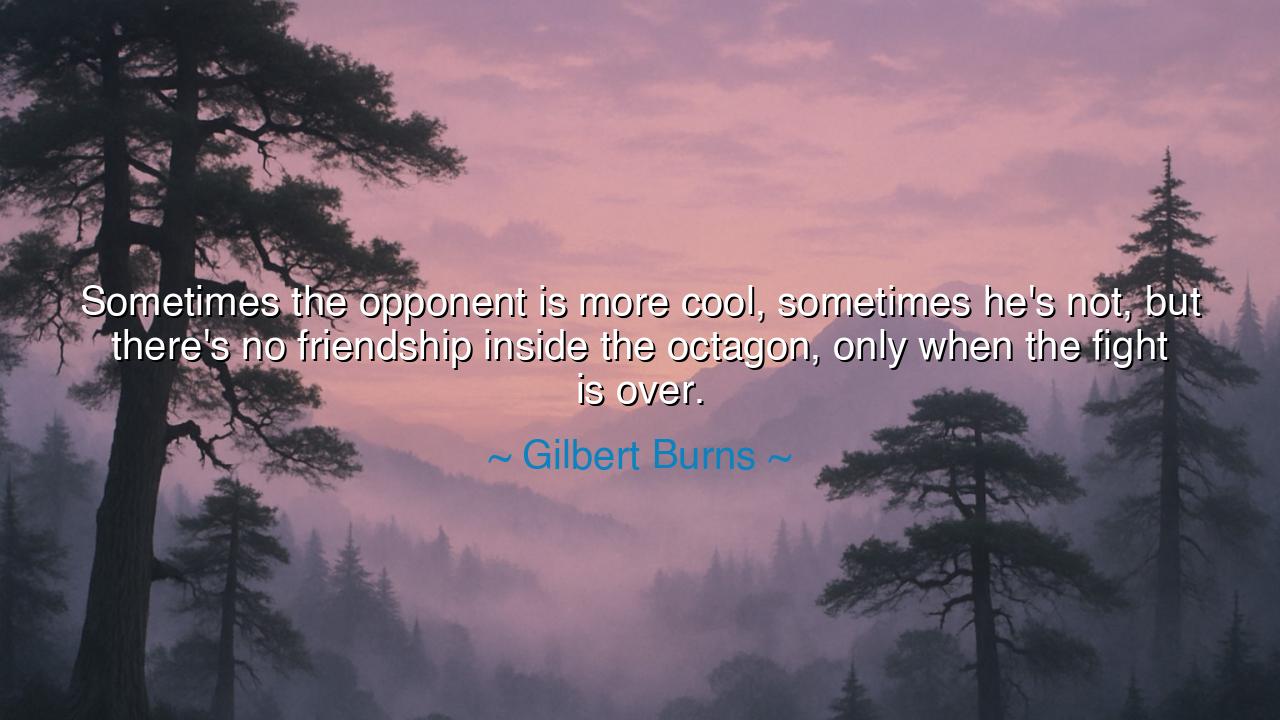
Sometimes the opponent is more cool, sometimes he's not, but
Sometimes the opponent is more cool, sometimes he's not, but there's no friendship inside the octagon, only when the fight is over.






The warrior Gilbert Burns, forged in the fire of combat and discipline, once spoke with clarity and truth: “Sometimes the opponent is more cool, sometimes he’s not, but there’s no friendship inside the octagon, only when the fight is over.” Though his words emerge from the world of mixed martial arts, their wisdom extends far beyond the cage. They speak to the essence of struggle itself — to the nature of conflict, purpose, and honor. Burns reminds us that in moments of trial, whether in battle, competition, or the great struggles of life, one must stand wholly present and unyielding, for there is no space for hesitation or sentiment until the struggle has passed.
In the manner of the ancients, let us look upon these words as we would upon the teachings of a philosopher-warrior. When Burns says there is “no friendship inside the octagon,” he does not speak of hatred, but of focus. The octagon — that sacred arena where two fighters meet in the purest test of strength, skill, and spirit — is a symbol of all arenas in life where men and women must give everything they have. Within its walls, there can be no distraction, no mercy born of attachment. Each fighter enters knowing that his opponent seeks victory just as fiercely as he does. And so, for that brief and fiery moment, friendship must yield to duty — to the noble task of giving one’s best.
The origin of this wisdom lies in the code of the warrior — a code older than time itself. The samurai of Japan understood it. The gladiators of Rome lived it. Even the athletes of ancient Greece, who competed not for wealth but for honor, followed it. They knew that while respect for an opponent is sacred, the contest itself is a field of truth, where sentiment cannot interfere. Burns, a modern embodiment of this spirit, channels that same ancient discipline. He acknowledges that an opponent may be kind or cruel, friendly or distant, but within the ring, all men are equal in purpose. There, only courage, skill, and willpower decide the outcome — not emotion, not friendship, not fame.
Consider the story of Achilles and Hector, two heroes of the Trojan War. Before their fateful duel, Hector was a loving husband and noble defender of his city, and Achilles, though wrathful, was not without heart. Yet when they met on the battlefield, all friendship, all pity, fell away. The fight was pure — not born of hatred, but of honor. Only after victory did Achilles weep over Hector’s fallen body, his rage cooled by the recognition of shared humanity. In that moment, he became again not a warrior, but a man. This is the truth Burns speaks of: battle demands total devotion, but when the battle is done, compassion and respect return, for the warrior’s heart must balance both fierceness and mercy.
There is a sacred duality in Burns’s words. He teaches that discipline in battle does not destroy friendship; it protects it. For true friendship, like true respect, can only exist between those who have tested one another in the fire of challenge. Inside the octagon, fighters do not hate each other — they reveal each other. Each blow, each move, strips away illusion until only truth remains. When the fight ends, what is left is understanding — a bond forged through shared struggle. This is why Burns says that friendship exists only when the fight is over: it must be earned through the honesty of conflict.
O seekers of strength, learn from this wisdom. In your own battles — whether of mind, of heart, or of circumstance — remember that there is a time for gentleness and a time for resolve. When you step into your “octagon,” whatever form it takes, bring your full being to it. Do not allow doubt, sentiment, or fear to divide your focus. Be present. Be fierce. Fight with honor. And when your struggle is done, when the dust has settled and victory or defeat is behind you, return to compassion. Shake hands with your opponent — whether that opponent was another person, your own weakness, or life itself.
And so, let Gilbert Burns’s words stand as a timeless teaching: there is no friendship in the midst of battle, but beyond it, friendship is reborn stronger than before. Respect your rivals. Honor your tests. Give your all in the fight, and your heart in the peace that follows. For this is the way of the true warrior — to fight without malice, to triumph without arrogance, and to live with humility once the contest is done. In this balance of strength and spirit lies the secret not only to victory, but to greatness itself.






AAdministratorAdministrator
Welcome, honored guests. Please leave a comment, we will respond soon